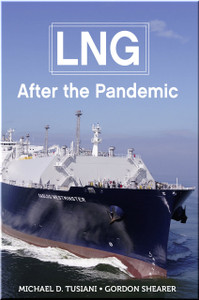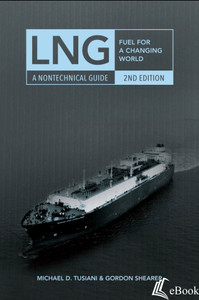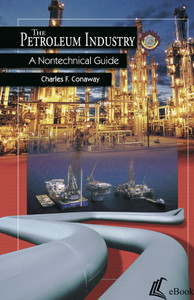Description
The world changed in 2020. An outbreak of Covid-19 turned into a worldwide pandemic followed by the Russian invasion of Ukraine just two years later. Two black swan events in the span of 24 months. LNG: After the Pandemic dives into the lessons learned from this unprecedented combination of events. Numerous trends are covered including volatile prices, the post-pandemic slump, increasing exports, the jump in European demand, and the pressures of decarbonization. This book considers the implications of these trends and sets the stage by looking at the fundamental changes in the industry that have occurred over the past decade. This new LNG landscape may help us discern where the industry's future lies. Despite the rhetoric, LNG is here to stay.
What the industry is saying
This book could not be more timely. Accessible, absorbing, and informative, it is a must-read for anyone interested not just in LNG, but global energy, geopolitics, and the energy transition. Tusiani and Shearer peel back the layers of a rapidly evolving industry in a way that is useful to policy makers and industry insiders alike. - Jason Bordoff, Founding Director, Center on Global Energy Policy at Columbia University's School of International and Public Affairs.
LNG has taken center stage during the Ukrainian crisis. This book will help the reader, whether an industry professional, policy maker or interested lay person understand the role LNG plays in the world's energy supply. A quick and comprehensive read. - Christopher J. Wiernicki, Chairman, President and CEO, American Bureau of Shipping (ABS)
Coverage
- The Outbreak
- Covid 19 and the Oil and Gas Markets
- The Economic Impact of Global Efforts to Control the Covid-19 Pandemic
- The Oil Price War
- The Initial Impact on Natural Gas and the LNG Market
- US LNG Producers Build a New Industry and Business Model-and Save the Market
- The Rise of the LNG Giants
- LNG Shipping Adapts to the Crisis
- Natural Gas and LNG-The Growing Environmental Challenges
- The Road to Recovery
- Lessons Learned
Features and Benefits
- A comprehensive review of the global LNG market during the aftermath of the pandemic and the Russian invasion of Ukraine.
- The book discusses the industry's relatively successful response to the drop in global gas demand and the collapse of oil prices, followed by its rebound in the runup to and in the wake of the Ukraine crisis.
- The factors behind LNG's newly demonstrated flexibility are analyzed and placed in the context of the longer-term outlook.
- A comprehensive overview of the headwinds likely to be caused by the drive for decarbonization of the world's energy supply chains.
Audience
- Analysts and commercialization teams
- Trading desks
- Management
- Energy lending and finance professionals
- Policy makers facing newly complex energy decisions
- Anyone who seeks to understand the dynamics of, or relies upon, energy
- Students
About the Authors
Michael D. Tusiani joined Poten & Partners in 1973. From 1983 to 2016 he served as its chairman and chief executive officer. He is currently the chairman emeritus. During his career, he has been active in all aspects of oil and gas trading and transportation and has written numerous articles on energy and shipping matters, as well as four books: The Petroleum Shipping Industry: A Nontechnical Overview (PennWell 1996), The Petroleum Shipping Industry: Operations and Practices (PennWell 1996), LNG: A Nontechnical Guide (PennWell 2007, coauthor), and LNG: Fuel for a Changing World (PennWell 2016, coauthor). He received a BA from Long Island University and an MA in economics from Fordham University.
Gordon Shearer has been active in the LNG industry for more than 25 years. He is a senior advisor with Poten & Partners, which he rejoined in 2015. From 2007 until 2013, he was CEO of Hess LNG (a joint venture of Hess Corporation and Poten & Partners). Before joining Poten in 2001, he was employed by Cabot Corporation, where he was CEO of Cabot LNG Corporation, which owned and operated the LNG terminal in Boston Harbor and the LNG carrier Matthew. During this time, he was heavily involved in the creation of the Atlantic LNG project in Trinidad and Tobago. He has written numerous articles on LNG and two books: LNG: A Nontechnical Guide (PennWell 2007, coauthor) and LNG: Fuel for a Changing World (PennWell 2016, coauthor). He received a BSc in geophysics from Edinburgh University in 1976 and an MBA from Harvard Business School in 1978. He was a member of the National Petroleum Council from 2005 until 2016.
Details
Type: eBook
Pages: 162
Published: January 2023
ISBN: 9781955578134
*The rental period begins upon redemption of the code. Redemption code(s) will be sent within 1 business day of purchase.







